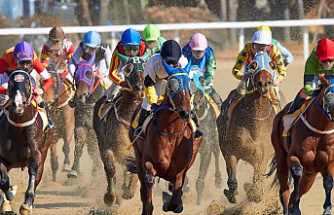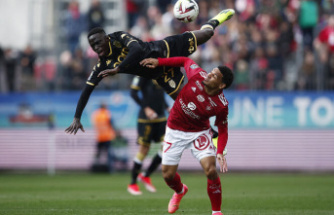Faisal is a trans woman. That's a problem for Faisal. Because she comes from Qatar and leads a life of constant fear in the desert state. Because people from the LGBTIQ movement are not tolerated in the emirate, which is hosting the soccer World Cup this winter. They are exposed to the constant danger of experiencing arbitrariness by the police and the authorities. RTL/ntv reporters Jonas Gerdes and Timo Latsch managed for the first time to speak to homosexuals and trans people from Qatar in front of the camera and to document the shocking insights into everyday life. In order to be able to talk openly about her oppressive living situation, Faisal traveled to Europe for the interview, to a secret place.
RTL/ntv: Faisal, you said that you feel different when you are here and not in your home country of Qatar. Can you briefly describe what exactly makes you feel different?
Faisal: It just feels good to be able to wear whatever I want to wear and present myself in public without fear of being attacked by civilians or accused by authorities of violating ethnic norms and culture.
When did you actually feel that you were a trans woman?
I've always known. But I only became aware of it when people told me not to behave like that or I should start acting more like a man or talk more like a man and stop talking about certain topics. They said "stop being so different". When I was growing up in Qatar, I was teased at school.
After you realized you wanted to change, who did you tell about it?
I started with my mother. I told her about it. And I spoke to other female family members. They were all very dismissive. They told me, "Why would you want to be a woman? Being a man is much easier and you should stop saying things like that," or "You should act like a man."
Were you able to convince your family members? Were you able to explain your situation and create a little understanding, or did these conversations lead to a break with the family?
I tried to talk to them and open up to them. They were very dismissive. When other people talked about me, they felt like I was embarrassing them. So they told me to stop doing this and that I was bringing them shame. I then felt bad for something I didn't do. I was accused of doing something wrong even though it wasn't my intention.
How does your life feel? For example, what is it like to dress like a man at work, in the supermarket or in other outdoor activities?
I've gotten better at knowing how to dress a certain way. So I don't cause unwanted attention. The way I present myself at home now is not the real me. It feels like I'm acting and I'm not myself. But after a while I lose touch with my identity and who I am. And then I just... I don't know how to explain it. It just feels like I'm slowly dying from the inside out. And I wouldn't be who I really am. I feel like an empty shell.
Other Qatari people I speak to about this issue describe similar feelings. They felt trapped and also talked about psychological problems.
Yes, definitely. It's not a very good environment for mental health to be told at a very young age that what you're doing brings shame and what you're doing is wrong when all you're doing is just being yourself . So you have to pretend you're someone else. And then when you do that, you're either unhappy or it's not very successful. It doesn't take very long before you try to be who you really are again. I left Qatar to do my bachelor's degree. I thought I'll never come back. But then I came back and I didn't feel like I wanted to be there at all. I felt like I was regressing, going back to the place where I was trying to escape my entire youth. So I started drinking heavily, even becoming an alcoholic.
What kind of discrimination have you experienced?
I was discriminated against at school and as I got older it also happened to me in public places. So I tried to be in public as little as possible, or at least not to go out in public alone. The worst is when I travel and then come back to Qatar and have to go through customs. These are the scariest experiences I've ever had. They force me to open my suitcase and go through all my personal belongings. They ask me why I own women's clothes and makeup. Even if I told them that owning women's clothing as a man is not illegal and is not comparable to drug smuggling, customs officials would insist that a man wearing women's clothing is against the law in Qatar. Even if I argued that the clothes are not mine, they would tell me that they would take me to the police station and search my cell phone. They put people in a situation where they can no longer argue. I would have to beg for them to let me go. This gives them a sense of power.
Do you remember the situation at the police station clearly?
They went through my personal belongings. They found something they thought was illegal. I was taken to the police station. The way they handled the situation was very unprofessional. They just wanted to humiliate me. I didn't know what was going on. I didn't know what I was doing. I didn't know how long I would stay there. They were just playing with me. Even if I try to think about it, I don't remember because I've blocked out a lot of the experience. They ended up making me sign a fake confession that I would never do what I did again. I still have no idea how I broke the law in the first place. The laws are very unclear, so anything can be illegal.
Speaking of penalties. Same-sex relationships are illegal and carry a theoretical penalty of up to seven years in prison. What are the punishments really like? I've even heard of people getting their heads shaved.
Regarding the first part: Yes, homosexual sex is punishable, but you have to be caught in the act. You can't just be punished without witnesses. But regarding the second question where you mentioned that the police shave people's heads, that actually happened to me once because I was at a mall with some friends and someone reported us. They reported us for being homophobic. Later, when my friends left and I was alone in the mall, the police came. They wanted to know where my friends were, but I told them I met these people in front of the mall. The police accused me of several crimes, such as dancing and other things that I didn't do. They took me to the police station and shaved my head. After a few hours they let me go.
How did you feel in this situation?
By the time it happened I lost all hope in the system. These people are supposed to protect us, but they do the complete opposite. They come to us and blame us for things we didn't do just to punish us. And if there were laws that said we couldn't do this or that, then we would know what we could and couldn't do. But it seems like they want to hide us or remove us from society. They don't want us to exist. According to the motto: "Never leave the house and do not appear in public."
How did your family react when they saw what happened to your hair?
I didn't tell my family because I was ashamed and because it would hurt my family a lot. There is also the possibility that they don't believe my story, but the story of the police, where I do all these naughty things. I can't even remember all the allegations. The main point was that I had behaved rudely in a family shopping mall, which is not in keeping with Qatar's conservative culture. After I was first accused of such acts, I told my uncle about the incident. I told him I was falsely accused of all of these things. He told me that was not acceptable and that he would talk to the police. After that I didn't hear from him for a long time. I did something that upset my uncle. Then he came to my house, came right into my room, took all my clothes, put them in the garbage bag and started telling me that I am bringing shame to the family. And he told me that I lied to him about the whole incident and made it all up.
There is no open LGBTQ community in Qatar. How is it possible for you to meet with others? Did you find a way to find people from this community?
I mean it's very hard to meet people or make new friends. Also, you have to understand that people who, like me, have experienced a lot of bad things in Qatar are not the easiest people to be friends with because I have my own traumas. Everyone has their own problems. It is also difficult for people with untreated mental health problems to form healthy relationships.
How At Risk Are Dating Apps From Government Surveillance?
I haven't had any bad experiences with dating apps. I've never been catfished by a cop. I've just never had any luck with the apps and stopped using them a while ago.
Another thing I've heard about is reparation or conversion therapy. Can you comment on that?
I heard about that too. A friend of mine was signed up for such therapy by his sister. So it's something that family members can also enforce.
By pretending that person is unhealthy?
no They even say publicly that they help with sexual deviants. Whether feminine men or masculine girls. It is publicly said that is what we heal. One of these clinics is supported by the Qatar Foundation.
Allah still plays a major role in Qatar: How has your religion changed?
I have studied Islam and homosexuality and there is not a single verse in the Qur'an that mentions it. So there are few hadiths that the Prophet said. But they are not very credible. They are not authoritative sources. The Koran does not talk about homosexuality. I don't know where the people who use religion to justify homophobia and prosecute homosexuals get their reasoning. However, not from Islam if you actually read the Koran.
Let's talk about the FIFA World Cup: I know that you are not particularly interested in football, but is there something in you that is looking forward to this event?
I have no expectations. I can imagine both possibilities, that it could be a very good or a very bad football tournament. I see it similarly with the effects on Qatar. The World Cup could bring positive changes for the country, but could also cause Qatar to regress and become even more conservative. Especially after Qatar has been heavily criticized by the West ever since they were awarded the World Cup.
Some Qataris told me that Western criticism was very offensive. Do you see it in a similar way to how, for example, Western politicians and journalists judge Qatar?
Sometimes I feel that way, but if they think it's unfair then criticism should come from inland. But that's not allowed either. We must not be critical. So if it doesn't come from us, it would have to come from the West, whether we like their criticism or not.
In your opinion, has there been a social change in recent years? Has it become more liberal or strict after Qatar won the bid in 2010?
I'm seeing some changes that I wouldn't say are positive changes. I feel like the country has become more defensive, more paranoid and more angry. They try to censor a lot. The government monitors and deters or silences local people who express criticism of the government and the World Cup. I've noticed that this happens often. It feels like Qataris are getting more and more angry at the West for all the criticism. There is no dialogue between the two parties. I don't know exactly how to explain that. Qataris think the West is after them and the West is trying to be critical of Qatar. However, this only fuels the anger and paranoia of the Qataris. This makes it increasingly difficult for the locals to live in this society.
Soccer players and officials have a lot of influence: Do you have expectations, for example, of national teams from Germany, Great Britain, or the USA? Should they demonstrate for the LGBTIQ scene in Qatar?
Do you think your protest will do anything positive or help the issue in any way? To be honest, I don't think so. I think it might even make it worse because if they protest some Qataris will get angry. They won't take out their anger on the German national team, but on people like us.
Jonas Gerdes conducted the interview with Faisal
Read the interview in English here.












